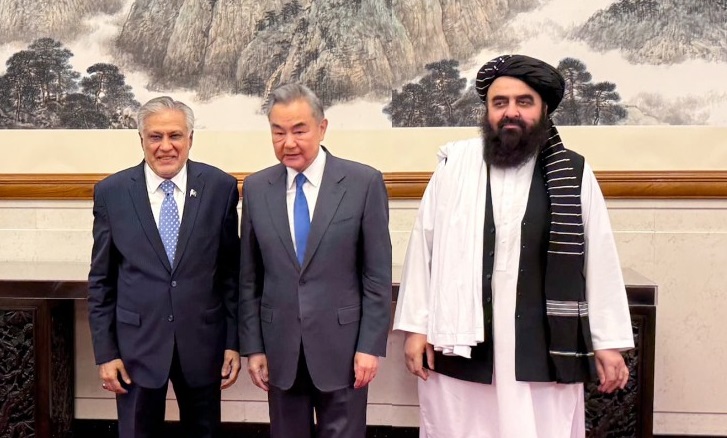
China, Pakistan, Afghanistan Agree to Expand CPEC
In a move with far-reaching regional implications, China, Pakistan, and Afghanistan have agreed to expand the China-Pakistan Economic Corridor (CPEC) into Afghanistan. The decision was taken during an informal trilateral meeting held in Beijing on May 21, 2025, with the aim of boosting infrastructure, connectivity, and economic cooperation in the region.
“China, Pakistan, Afghanistan agree to expand CPEC during trilateral talks”
CPEC Extension to Afghanistan Confirmed
The meeting included Pakistan’s Deputy Prime Minister and Foreign Minister Ishaq Dar, Chinese Foreign Minister Wang Yi, and Afghanistan’s Acting Foreign Minister Amir Khan Muttaqi. All three sides reaffirmed their support for regional integration under China’s Belt and Road Initiative (BRI), with a clear signal that CPEC’s next phase would include strategic projects inside Afghanistan.
This extension is expected to provide landlocked Afghanistan with new infrastructure corridors for trade and logistics, while enabling China and Pakistan to secure deeper influence and economic stakes in the country.
Strategic Goals Behind the Expansion
The strategic implications of expanding CPEC into Afghanistan are multifold:
- For China, it deepens its Belt and Road footprint and offers overland access to Afghanistan’s untapped mineral wealth.
- For Pakistan, it reinforces its geostrategic role as a regional transit hub and potentially stabilizes its volatile western frontier.
- For Afghanistan, the promise lies in roads, railways, energy grids, and investments that could support long-term reconstruction and trade diversification.
The countries expressed optimism that the project would serve not just economic goals but also “regional peace and stability”—although such ambitions remain contested by several external powers.
India’s Geopolitical Objection
India has long opposed the CPEC project, primarily because it passes through Gilgit-Baltistan in Pakistan-occupied Kashmir, a region New Delhi claims as its sovereign territory. The addition of Afghanistan to the CPEC framework is likely to heighten India’s security concerns.
Analysts warn that the move could reduce India’s post-2021 influence in Afghanistan and further tilt the regional strategic balance in favor of the China-Pakistan bloc. New Delhi is expected to register its objection through diplomatic channels and international forums, citing sovereignty and regional security.
Next Round of Talks in Kabul
The three nations have agreed to hold the next Trilateral Foreign Ministers’ Meeting in Kabul, though a date has not yet been announced. This ongoing engagement suggests a roadmap for expanding China’s regional ambitions through multi-nation projects despite international reservations.


















